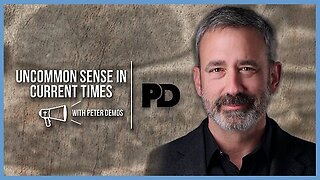Premium Only Content

Episode 2041: The Power of Words Harnessing Speech for Good
Walt: Welcome back to another episode of Catholic Reboot and I'm your host, Walt, and joining me as always is my esteemed co-host, Nancy. By the way, I can’t wait for you and Sharon to do another episode together.
Nancy: Hey everyone, glad to be back and yes Sharon and I are overdue.
Walt: Today, we're delving into a topic that's as old as humanity itself but still holds immense relevance in our modern world: the power of words. We'll be exploring the profound wisdom in two quotes, one from St. Sisoes and the other St. Anselm of Canterbury.
Nancy: Indeed, Walt. These quotes remind us of the importance of controlling our speech, being mindful of what we say, and recognizing the impact our words can have on ourselves and others. Before starting with the quote from St. Sisoes (sis-oy’-us): let me tell you who St Sisoes (sis-oy’-us) was:
St. Sisoes, (sis-oy’-us) also known as Sisoes (sis-oy’-us) the Great or Sisoes (sis-oy’-us) of Egypt, was a Catholic monk and Desert Father who lived during the fourth century AD. Walt, I know how through Fr Abernathy you have gained a great love for the writings of the Desert Fathers like St Cassian (like glass) as well. Well in that same spirit, St. Sisoes (sis-oy’-us) is revered as one of the great ascetics and spiritual figures of early Catholicism. (practiced severe self-discipline and abstention)
Sisoes (sis-oy’-us) was born in Egypt, around the year 330 AD, and he spent much of his life in the desert wilderness of Scetis (see’-tiece’)(or Wadi El Natrun), an area known for its thriving monastic communities. He was a contemporary of other renowned Desert Fathers from that time such as St. Anthony the Great, St. Pachomius, and St. Macarius of Egypt. All of whom are worth looking up if you have the time. And I’d like to quickly pass along some great advice I got from one of my teachers - while you are reading, if you encounter a word, name, phrase, etc. that you don’t know, stop and take the time to look it up - it sounds tiresome, I get it, but trust me - it makes a difference in your comprehension and you’re learning something new.
In any case, in continuing, the life of St. Sisoes (sis-oy’-us) was based on extreme humility, asceticism, and wisdom. According to tradition, he lived as a hermit for many years, devoting himself to prayer, fasting, and contemplation. He is said to have possessed great spiritual insight and the gift of discernment, which attracted many to seek his counsel.
One famous story about St. Sisoes (sis-oy’-us) involves his encounter with a monk who had committed a grievous sin. Instead of condemning the monk, Sisoes (sis-oy’-us) wept for him, demonstrating his deep compassion and understanding of human frailty.
St. Sisoes (sis-oy’-us) is also remembered for his humility. He is said to have lived in a small cell and practiced extreme self-denial, considering himself the worst of sinners despite his reputation for holiness.
St. Sisoes (sis-oy’-us) died around the year 429 AD at an advanced age of 99 years old, having spent his life in prayer and asceticism. He is venerated as a saint with his feast day celebrated on July 6th.
Throughout the centuries, St. Sisoes (sis-oy’-us) has been revered as a model of Catholic virtue, particularly for his humility, compassion, and devotion to God. His life and teachings continue to inspire Catholics seeking a deeper spiritual life.
Now for the quote, "Exile means that a man should control his mouth." This quote speaks volumes about the significance of self-discipline in speech. In a world where words are often spoken impulsively and without consideration, St. Sisoes (sis-oy’-us) reminds us that true mastery lies in controlling the tongue.
Walt: That's right, Nancy. Our words have the power to build or destroy, to heal or harm. Exercising restraint in speech allows us to cultivate a sense of inner peace and avoid unnecessary conflicts or regrets.
Nancy: Precisely, Walt. Let me break this down even further:
"Exile means that a man should control his mouth": This suggests that true exile, or separation from worldly distractions, involves exercising control over one's speech. In the context of traditional Catholic spirituality, it highlights the importance of discipline and self-mastery, particularly in the realm of communication.
Application to our times: In today's culture of constant communication and social media, the need for controlling one's speech is as relevant as ever. The internet provides a platform for instantaneous expression, often leading to impulsive or thoughtless communication. St. Sisoes' (sis-oy’-us) teaching challenges believers to cultivate inner discipline and mindfulness in their speech, resisting the temptation to engage in harmful or uncharitable discourse.
Controlling the tongue: The Catholic tradition places significant emphasis on the power of the tongue and the importance of guarding one's speech. Scripture warns against the dangers of gossip, slander, and deceitful speech, urging believers to use their words for good rather than harm.
Application to our times: In an era marked by online anonymity and the proliferation of misinformation, the need for controlling the tongue is paramount. St. Sisoes' (sis-oy’-us) teaching encourages Catholics to exercise prudence and discernment in their online interactions, avoiding the spread of falsehoods and inflammatory rhetoric. It also reminds believers to be mindful of the impact their words can have on others. We should be striving to promote truth, charity, and unity in all communication.
The virtue of silence: Didn’t we grow up hearing “Silence is golden?” There is a reason why we use the word golden, right? (highly favored, high degree of excellence) Silence has long been revered as a spiritual discipline in Catholic tradition, allowing individuals to listen more attentively to the voice of God and cultivate a deeper interior life. St. Sisoes' (sis-oy’-us) quote underscores the value of silence as a means of self-restraint and inner purification.
Application to our times: In a world filled with noise and distraction, the practice of silence is increasingly rare yet desperately needed. St. Sisoes' (sis-oy’-us) teaching encourages Catholics to carve out moments of quietude amidst the busyness of daily life, allowing space for prayer, reflection, and communion with God. It also reminds believers of the power of silence in fostering deeper relationships and understanding with others, transcending the limitations of words.
In summary, St. Sisoes' (sis-oy’-us) quote from a traditional Catholic perspective calls believers to exercise control over their speech, recognizing the importance of the old saying “If you have nothing good to say about someone don’t say it at all.” It challenges Catholics to navigate the complexities of modern communication with integrity and mindfulness, striving to use their words for the greater glory of God and the building up of the human community.
So St. Sisoes (sis-oy’-us) was not the only saint to remind us to control our tongues, but isn’t it remarkable how we can look back to 400 AD and realize the never ending need for these lessons to be taught and re-taught. We know that the battle against the devil, the temptations, and evil, will never stop so that means that we can’t stop
Walt: And this ties nicely into the second quote from St. Anselm of Canterbury's. But before we discuss this Saints quote let me provide some background.
St. Anselm of Canterbury, also known as Anselm of Aosta, was a medieval theologian, philosopher, and Benedictine monk who made significant contributions to Western Catholic thought. He is celebrated as a Doctor of the Church for his profound theological writings and his role in shaping medieval scholasticism.
Early Life and Education: Anselm was born in 1033 in Aosta, Lombardy, which is now part of modern-day Italy. He came from a noble family and received an education in the liberal arts. Even from a young age, he displayed an intellectual curiosity and a deep religious devotion.
Monastic Life: Despite his father's objections, Anselm desired to become a monk. In 1059, he entered the Benedictine monastery of Bec in Normandy, France, where he studied under Lanfranc, the prior and future Archbishop of Canterbury. Anselm excelled in his studies and embraced the monastic way of life wholeheartedly.
Scholarship and Writing: Anselm's intellectual pursuits flourished during his time at Bec. He wrote several important philosophical and theological works, including "Monologion" and "Proslogion," in which he formulated his famous ontological argument for the existence of God. His works often sought to reconcile faith with reason and to deepen understanding of Christian doctrine.
Nancy: Wait a minute Walt, before you go on can you explain what the word "Monologion” is?
Walt: Sure, the word is derived from Greek roots: "mono" meaning "alone" or "single," and "logion" meaning "word" or "speech." So, "Monologion" can be understood as "a single discourse" or "a solo argument."
In the context of Anselm's work, the "Monologion" is a treatise in which he engages in a solitary reflection on the existence and attributes of God. In this text, Anselm seeks to demonstrate the existence of God and explore various divine attributes through rational argumentation and contemplation. The "Monologion" is significant for its development of Anselm's philosophical and theological ideas, particularly his ontological argument for the existence of God, which he further elaborates in his later work, the "Proslogion."
Nancy: I know I may take you down a rabbit hole but what was "Proslogion"?
Walt: Well that book is well worth a separate episode but overall it contained Anselm's reflections on divine attributes, the relationship between faith and reason, and the nature of human understanding in relation to the divine. It remains one of Anselm's most enduring and influential works, continuing to provoke philosophical and theological discussion to this day.
But let me get back to his biography.
Archbishop of Canterbury: In 1093, Anselm was appointed Archbishop of Canterbury, succeeding Lanfranc. As archbishop, he faced numerous challenges, including conflicts with English kings over issues of ecclesiastical authority and church reform. He defended the rights and independence of the Church against royal encroachments, asserting the primacy of spiritual over temporal authority.
Exile: Anselm's tenure as Archbishop of Canterbury was marked by conflicts with King William II and later King Henry I over issues such as lay investiture and the authority to appoint bishops. These disputes led to periods of exile for Anselm, during which he sought refuge in various monasteries on the Continent. Despite the challenges, he remained steadfast in his convictions and continued to advocate for the rights of the Church.
Death and Legacy: St. Anselm died on April 21, 1109, in Canterbury, England. He was canonized by Pope Alexander IV in 1163 and later declared a Doctor of the Church by Pope Clement XI in 1720. Anselm's theological writings, particularly his contributions to the philosophy of religion and his defense of Christian doctrine, continue to be studied and admired by theologians and philosophers to this day. He is remembered as one of the greatest thinkers of the medieval period and a key figure in the history of Western Catholic thought.
Now for his quote:
"Thy mouth is the mouth of Christ; therefore thou mayest not -- I speak not of detractions, nor of lies -- thou mayest not open for idle speeches that mouth which should be reserved only for the praises of God and the edification of thy neighbor."
Nancy: Let's break down St. Anselm of Canterbury's quote from a traditional Catholic perspective and apply it to contemporary times:
"Thy mouth is the mouth of Christ": From a traditional Catholic perspective, this phrase emphasizes the belief that as Christians, we are called to be Christ-like in all aspects of our lives, including our speech. Our words should reflect the love, compassion, and truth exemplified by Jesus Christ during his earthly ministry.
Application to our times: In today's world, characterized by rapid communication through social media and digital platforms, this reminder is crucial. It calls on believers to consider whether their online interactions truly reflect the values and teachings of Christ, or if they contribute to division, negativity, and discord. Sometimes it seems as though social media is the outlet for “one-upmanship,” you know what I mean?
"Thou mayest not open for idle speeches": Idle speech refers to words that serve no constructive purpose or are devoid of meaning. In the Catholic tradition, idle gossip, slander, and frivolous talk are seen as harmful and contrary to the virtues of charity and kindness.
Application to our times: In the age of constant connectivity, it's easy to engage in idle chatter or participate in conversations that lack substance or value. Isn’t that what social media allows us to do all day, every day? St. Anselm's admonition challenges us to use our speech wisely, to refrain from spreading rumors or engaging in divisive discourse, and instead, to focus on words that uplift and inspire others.
"Reserved only for the praises of God and the edification of thy neighbor": This part underscores the dual purpose of speech in the Christian life: to glorify God and to build up our fellow human beings. Our words should be a reflection of our gratitude towards God and a means of encouraging and supporting those around us.
Application to our times: In a world where negativity and cynicism often dominate public discourse, this aspect of St. Anselm's teaching reminds us of the power of positive affirmation and encouragement. It challenges us to use our words to express gratitude, to offer words of affirmation and support to those in need, and to foster a culture of kindness and compassion.
This is so true. I remember telling my students how easy it is to gossip or speak ill of someone or laugh at the misfortune or bad luck of others. How often do we spread good news about someone?
In summary, St. Anselm's quote from a traditional Catholic perspective emphasizes the sacredness of speech and the responsibility that comes with being a follower of Christ. It calls on believers to use their words in a manner that honors God, builds up others, and contributes to the betterment of society, even in the midst of the challenges and complexities of contemporary times. In a society inundated with noise and chatter, it's becoming increasingly rare to find individuals who value meaningful conversation over idle gossip or trivial banter.
Walt: It's a powerful reminder that meaningful communication requires both speaking and listening attentively. In a world where everyone seems to be talking, there's a profound need for genuine connection and understanding.
Nancy: Absolutely, Walt. Our words have the potential to reflect the light of truth and love, or to perpetuate darkness and division. By aligning our speech with the virtues of compassion, empathy, and wisdom, we can contribute to the healing and transformation of our world.
I couldn’t help but link the words of St. Sisoes' (sis-oy’-us) from the time of 400AD, to St. Anselm around the 1100s, to two other quotes - one from St. Alphonsus Liguori who died in 1787 up to CS Lewis who died in 1963. Really just to show the connectivity in the ongoing lesson about the power of silence.
To be silent when we are impelled to utter words injurious to God or to our neighbour, is an act of virtue; but, to be silent in confessing our sins, is the ruin of the soul. ~ St. Alphonsus De Liguori died 1787
I have often repented of speech but hardly ever of silence. died 1963
C. S. Lewis
Walt: Well said, Nancy. It's a reminder for all of us to pause and reflect on the words we speak, recognizing the sacredness and power inherent in every utterance.
Nancy: Indeed. Thank you for letting me join you in this insightful discussion. And to our listeners, we encourage you to contemplate how you can harness the power of your words for the greater good. And as always, may God bless you abundantly. Let me end with a prayer?
-
 0:46
0:46
Dr Disrespect
7 hours agoIt's not just a stream... it's an experience
182K1.44K -
 LIVE
LIVE
80sKiid
2 hours ago $1.15 earnedFirst stream on RUMBLE!!!!!
721 watching -
 LIVE
LIVE
JakeParker
2 hours ago $1.87 earnedJakeParker is LIVE on Rumble
681 watching -
 LIVE
LIVE
SpartakusLIVE
3 hours ago $3.14 earnedThe Duke rallies squad for LAUGHS into the night with a SMATTERING of TOXIC banter
898 watching -
 LIVE
LIVE
Flyover Conservatives
21 hours agoGeneration Z’s Revolution: 17 Year Old Author on the Return of Faith, Family, and the End of Feminism - Hannah Faulkner; Economic Update - Dr. Kirk Elliott | FOC Show
438 watching -
 LIVE
LIVE
Adam Does Movies
5 hours agoMoviegoers Are Singing Now! + Lilo & Stitch + Sonic 3 - LIVE!
500 watching -
 1:26:05
1:26:05
Donald Trump Jr.
8 hours agoRegime Media Imploding: What’s Next for MSNBC? Plus Michael Knowles & Alex Marlow | TRIGGERED Ep.194
166K152 -
 37:26
37:26
Glenn Greenwald
6 hours agoGlenn Takes Your Questions: On Trump's Cabinet, The G20 Summit, and More | SYSTEM UPDATE LOCALS SPECIAL
45.6K18 -
 UPCOMING
UPCOMING
We Like Shooting
13 hours agoWe Like Shooting 586 (Gun Podcast)
97 -
 52:14
52:14
Uncommon Sense In Current Times
7 hours ago“Pumpkin Pie Politics: Bridging the Thanksgiving Divide to Protect The Family"
44